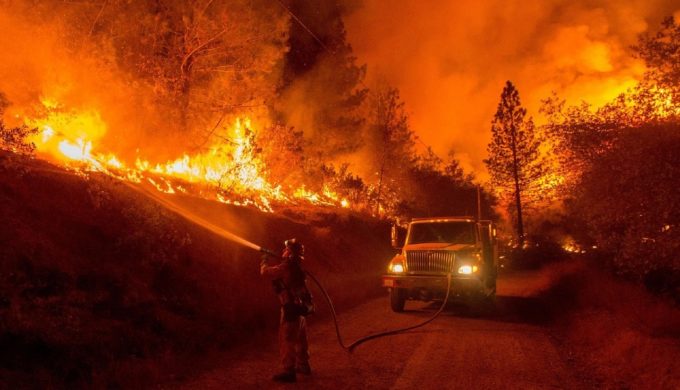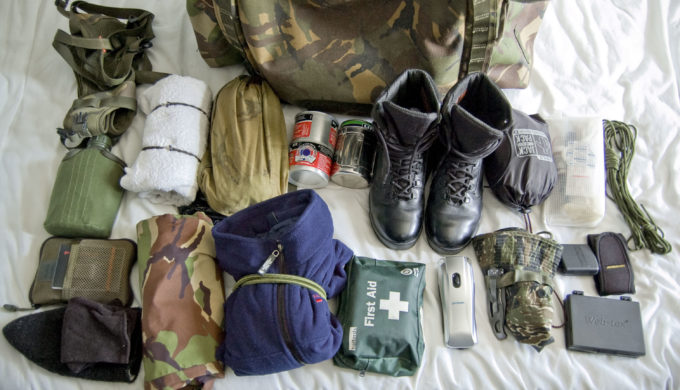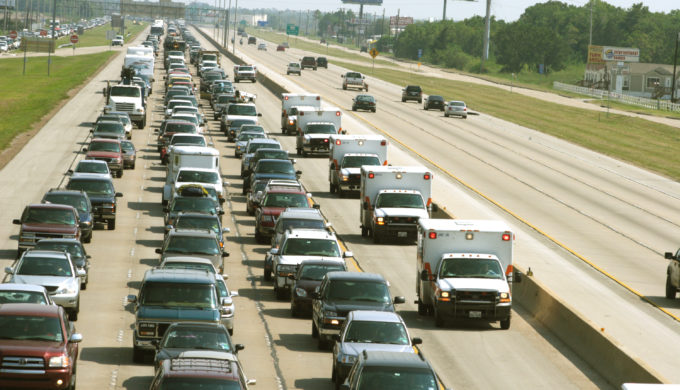As a first responder, sworn or not, when a natural disaster like a hurricane, fire, or flood hits you may find yourself torn. Do you protect the community that you have promised to take care of? Do you abandon the community in favor of your family that you have also promised to take care of? Knowing your family is safe and has a plan might make the decision easier.
Most law enforcement agencies, fire departments, and first responders follow a set of protocols in any situation. These protocols are well thought out procedures and steps to be taken specific to the disaster. They are planned way in advance so that taking care of disasters is merely a matter of following the guidelines in the protocols. Why not set up protocols and make preparations in advance to take care of your family as well?
Wildfire Photo: Pixabay/skeeze
Store away non-perishable food and water. Canned vegetables, rice, dried beans, and canned meats make great staples. There are lots of ways to store water, and while bottled is the least efficient, it’s the most convenient to keep in your car. For larger volumes of water, to keep at home for instance, water cooler jugs are great because they can be recapped and often refilled at the store from which you’ve purchased them.
Freezing water in milk jugs has several benefits. It cannot be used for drinking but it can be used as wash water, water to flush your toilet (your toilet will flush if there is water in it), it will keep food colder longer in the freezer if the power goes out, and because it takes up a large space, it will save on energy costs because there’s less space in your freezer to keep cool.
2. Prepare Your Spouse and Children
Flooding Photo: Flickr/DVIDSHUB
The first question to ask your spouse is “Will you be okay here if I have to be gone for three to five days?” Many first responders responding to a natural disaster will be away from home a minimum of three to five days. Make sure your spouse is comfortable with this. If not, find out why not and do what you can ahead of time to fix the issue.
Turn off the television and take the family outdoors. Camping skills, such as building a fire and finding shelter, teach great survival skills.
Check out the Pillowcase Project, a program put on by Disney and the Red Cross to teach children about disaster preparedness.
Lightning Photo: Pixabay/nickgesell
Build a community of like-minded individuals. Would you rather have friends and family come to your safe house with their own supplies or have them show up empty-handed to use up the resources you and yours have put by? Create a tribe of people with varied skills who can help one another out in a disaster situation.
“You’re building a mutual aid society,” explained Peace Officer J. Jason Welin, who hosted an emergency preparedness class at the 2014 ILEETA Conference. “You hear your friends often say, ‘When sh*t hits the fan, I’m coming to your house ‘cause you have all the guns and ammo. What you want to hear is, ‘We’ll bring the propane and you make the dinner.’”
4. Prepare Your Home Protocols
Photo: Flickr/Jessica C
Start now collecting information and putting together plans for what if scenarios. There is nothing wrong with putting together three ring binders of information and labeling them “hurricane”, “wildfire”, “first aid”, or “flood.” Do you know how to start a fire? Can you use your backup generator? Do you know basic lifesaving first aid? Teach your family the protocols in the binders. Let actions become reflex. Build muscle memory. Not sure where to start? Go online to the Red Cross, CDC, or Ready.gov.
All of your equipment and preparations will do no good if you’re trapped outside the home. Ask yourself the following questions about prep outside the home:
- Do you have what you need to camp out in the squad room?
- Is there emergency equipment in your vehicle?
- Is there emergency equipment in your families’ vehicles?
- Is your child prepared at school? (There are kits available meant to be stored in a locker)
- Is your child away from home (away at college, remote) prepared?
5. Prepare an Exit Strategy
Photo: By Ed Edahl / FEMA
If your spouse and children have to leave town without you — have a game plan in place that includes where they plan to go and the best routes to get there. If everyone is fleeing, you’ll want to avoid high-traffic areas when possible. Keep a map in your glove compartment. Have a safe meet-up place pre-designated.
Many of these tips came from Police One.







